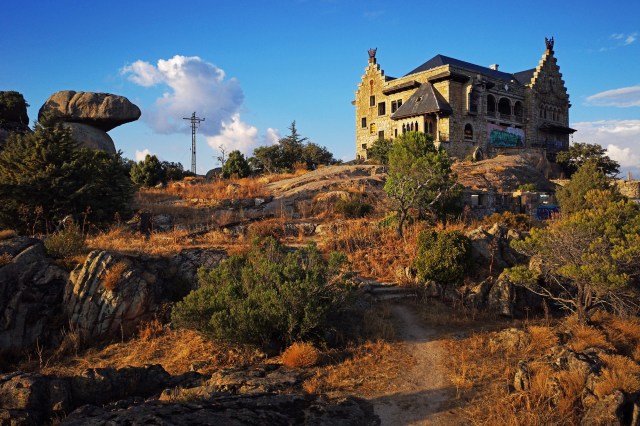Are Spain’s glory days past? Credit: Gabriel Solera/Getty Images

Every summer, bookshops lay out stacks of blockbusters designed to be devoured in an afternoon and forgotten in a week. But at UnHerd we prefer books that leave a lasting impression. In this series of Summer Reads, our contributors recommend overlooked books that will engage and enrich you, not just distract you.
Let me just come out and say it. Decadent proclivities brought me to The House of Ulloa. My initiation took place in New Cross, South London, at an academic conference where the souvenir tote bags depicted the Goat of Mendes cavorting with a tortoise. In rooms at the Stuart Hall building of Goldsmiths College, guests of the Decadence Research Unit gave papers on the literature of auras, telepathy, astral projection and Satanism.
A South Korean Shakespeare professor talked about tantric philosophy and W. B. Yeats’s vasectomy. A dapper Swedish lecturer in religion spoke of Méphistophéla (1890), a French novel in which lesbian demon-worshippers offer baskets of severed penises to a female succubus. A Spanish researcher, Leire Barrera-Medrano, described the fiction of Emilio Pardo Bazán, decadent, feminist, theosophist, aristocrat and the author of The Black Siren (1908), the story of a devil-worshipping dandy with the power to compel people to commit suicide.
I was reeling. Suddenly, Proust’s mental time travel and Freud’s interest in telepathy made sense. Here was the lost, weird context of European modernism. Most of it, frustratingly, untranslated into English.
With one notable exception. Emilio Pardo Bazán’s The House of Ulloa (1886). A novel from her early period, written long before she developed an interest in hypnotism and the Black Mass. Back in the 1880s, she considered herself a naturalist in the style of Flaubert. But she was also a state of the nation novelist. That nation was her native Spain, and its state was decay.
The hero of The House of Ulloa is a mimsy young priest, Father Julián Alvarez, who is despatched to a crumbling estate in the Galician sticks to inject a little order and piety into the affairs of its resident marquis. Some hope.
As he arrives at the manor like a comic, clerical version of Jonathan Harker at the beginning of Dracula, he sees a dirty four-year-old boy, the marquis’s illegitimate son, being bitten by a dog from whose bowl he has attempted to snatch a hunk of meat. The marquis consoles the lad by sluicing wine down his throat. The boy seems delighted to be drunk. “On certain feast-days,” stammers Father Julián, wondering if he is about to witness a sudden death, “I don’t dislike a little anisette with my coffee.”
Like many great novels, it’s possible to read The House of Ulloa for the food. Bazán doesn’t mind tarrying in the kitchen. Her flavours are strong and she gives us all the details. Chicken casseroled in an egg-yolk sauce. Cauliflower salad and quince jelly sent in from the local convent. Mataburrillo, a stew of goat’s tripe, liver and lungs. Bread soup, cooked slowly in fat with red sausage, chickpeas and sliced hard-boiled eggs.
The political background, though, is just as piquant. We’re in a period of turmoil and uncertainty. The Glorious Revolution of 1868 has propelled Queen Isabella II from the Spanish throne. A Provisional Government has been formed. Its Prime Minister, Juan Prim, has been shot by an unknown assassin. Radicals have declared a republic, brought swiftly to an end by the installation of Isabella’s son, Alfonso XII, as constitutional monarch. Local politicians – as far as Bazán is concerned – are hopelessly self-interested. Spain is sinking into a post-imperial dream-state, while these men manoeuvre for power.
A pair of figures receive Bazán’s cool attention. Barbacana is a lawyerly bigwig who fights his battles from behind a desk, leaving the violent stuff to a wall-eyed henchman from Castrodorna. (Clearly bandit territory.)
The more dangerous of the two is Trampeta – “the Trickster” – a man so promiscuous in his deceptions that the electorate simply can’t keep track of them. (“Thanks to the extent of Trampeta’s machinations,” we’re told, “many of the things he did were winked at, or a blind eye was turned to them.”)
There is strong music in his name. When Bazán’s narrator declares that Trampeta “felt certain of impunity, even if he were to burn down half the town and beat up, sue or imprison the other half”, you wonder if this part of Galicia has a Fifth Avenue. You may also find yourself speculating about how to inhabit a culture like this, which seems not to know whether it is alive or dead.
Bazán was in in love with death. As time went on, her passion increased. She was one of those writers who greeted the fin de siècle by embracing the outré and the esoteric. Despite her devout Catholicism, she even defended the practice of Satanism. “To believe in the devil is to believe in God,” she wrote in 1911. On my day with the Decadence Research Unit, Leire Barrera-Medrano offered a way to interpret Bazán’s position. Her engagement with the occult, she suggested, “was a necessary spiritual expurgation”.
These, I suppose, are the seductions of decadence. To gaze upon the process of decay, feel a melancholy pleasure, and nurse the idea that at some point in the future, new life will flower.










Join the discussion
Join like minded readers that support our journalism by becoming a paid subscriber
To join the discussion in the comments, become a paid subscriber.
Join like minded readers that support our journalism, read unlimited articles and enjoy other subscriber-only benefits.
Subscribe